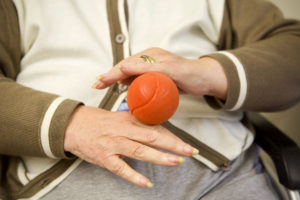Dementia – Exercise keeps the brain healthy
WHY DO I NEED TO EXERCISE?
A dementia diagnosis can be a difficult and scary time for a person. However, exercise is one activity which may seem unimportant, but can really help with numerous aspects of the disease. Dementia is due to a deterioration of part of the brain, exercise can help to maintain other parts of the brain not affected by the disease and help retain motor skills. Exercise is also known to help maintain brain function and therefore prevent further progression of dementia.
Apart from the obvious physical benefits of exercise for people living with dementia, exercise can help with mental and psychological health, especially reducing social isolation. Exercise in a group setting can offer people living with dementia the opportunity to socialise and interact with others. Exercise can also help with mood and sleep patterns.
At Siel Bleu, we provide a dementia gym class, which focuses on trying to connect the brain with the body again by using exercise as the instruction.
We try to focus on simple instructions and movements that would mimic day to day activities in order to get the most physical benefits.
We also do a lot of cognitive work for dementia to improve relationships with interactive games. Some examples are –
1. Marching of feet at a different speed (this may not seem like an exercise to many, but it can be a difficult task for those with severe dementia)
2. With a ball in your hand, roll it around the back of your hand. Once they are able to this, challenge them by circling the ball around the hand (this can be quite challenging for some)
3. With the ball, roll it from the back of the hand all the way up to the shoulders

We also do a lot of exercises around memory and language, allowing participants to learn new skills to further enhance the brain’s function. Sometimes we carry out exercise in Irish, counting numbers or giving an instruction such as up and down to encourage memory stimulation.
Apart from exercises for older adults with dementia, exercise is also vital to prevent the likelihood of developing dementia. There are numerous studies, which say exercise has an impact on preventing dementia, specifically practised during middle age. There are numerous ways to help prevent dementia such as “exercising” your brain with brain training apps, crosswords and Sudoku and learning a new language, however, exercise can also help by improving socialisation and hand/eye coordination.

THE DEMENTIA DIET
People living with dementia might have a different diet, not necessarily because of the disease itself but because of their behaviours towards eating. Many have said eating is the most challenging parts of the entire dementia journey. This could be due to someone continuously forgetting to eat or forgetting they ate already which can lead to being under or overweight. Thus it is important to know whether your loved one is underweight or overweight and list out the meal that is designed for them.
Try to use plates that have a contrasting colour from the tablecloth and napkin but make sure that there are no patterns on them to reduce distraction. Also, ensure the dining room or area is quiet; a busy room with background noise can be distracting for people with dementia.
Underweight: They might not be eating because their brain is not sending them the hunger signal.
1. Finger food will be the best solution. Something that isn’t too much. Such as sandwich but cut small so that it won’t be too overwhelming for them
2. Small plates with only one or two options can reduce confusion.
3. Fruits and vegetables as a healthy snack. So they get some sweet and it’s healthy. Best of both worlds!
4. Make sure they are hydrated all the time. If they can’t feel hunger they won’t be able to say they are thirsty as well
5. Show your loved one how to carry out the daily task. Remember when giving instruction to a person with dementia, do it only once and allow them the time to process. Repeating instructions can seem like a new instruction and can cause confusion.
It is possible for a dementia adult to feel hungry all the time because the brain didn’t register that he/she had a meal already. This can lead to them being overweight. There are a few ways to overcome this.
1. Since they can’t remember they have eaten, cut the portion size smaller so that they can eat regularly. Keep the meal within the recommended calorie allowance
2. If there are overweight because they love sugary food, try and swapping them with fruits or boiled sugar-free sweets.
3. Instead of giving them desert all the time, make it a special occasion. Give it to them during birthday or give them low sugar deserts such as sugar-free jelly instead.
4. Reduce the amount of sauce such as mayonnaise.
5. It’s best to avoid caffeine and drink mineral or fruit juice or sugar-free soft drinks occasionally.
DIET AS PREVENTION
Diet can play a vital role in the prevention of dementia. Here are some foods to introduce into your diet to keep your brain healthy.
Prevention 1: Green leafy vegetables such as kale, spinach, broccoli and other vegetables rich in vitamin A and C. Consume at least 2 servings per week.
Prevention 2: Nuts are a good source of healthy fats for the brain especially almonds or walnuts. Maybe that’s why walnut shape like a brain? You can take up to 5 servings a day depending on how much fats you need in your diet. Take note, 12 almonds make up a serving. Avoid coated flavour nut because it defeats the purpose.
Prevention 3: It’s recommended to eat two servings of blueberries per week.
Prevention 4: Beans are also recommended as they are packed with fibre and protein and low in calories and fats. They help to keep a person’s mind vigilant. However again the method of preparing a meal with beans should not be too high in sodium.
Prevention 5: Wholemeal is the go-to carbohydrate! It is packed with fibre and recommended to eat three times a week.
Prevention 6: It’s recommended to eat oily fish such as salmon, trout or mackerel at least once a week.
Prevention 7: White meat is also good for the brain. Opt for lean meat such as turkey or chicken and ensuring you remove the skin before eating.
Prevention 8: Good news to those who love red wine. Research has shown that red wine may be able to help prevent dementia. Hold on though, it’s only one glass per day. Well, better than nothing!
**Disclaimer: The advice given in this blog is meant as a suggestion only. It is important to ask your doctor/dietitian before making any changes to your lifestyle.


